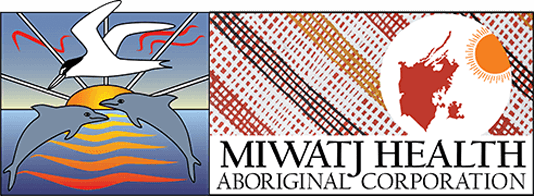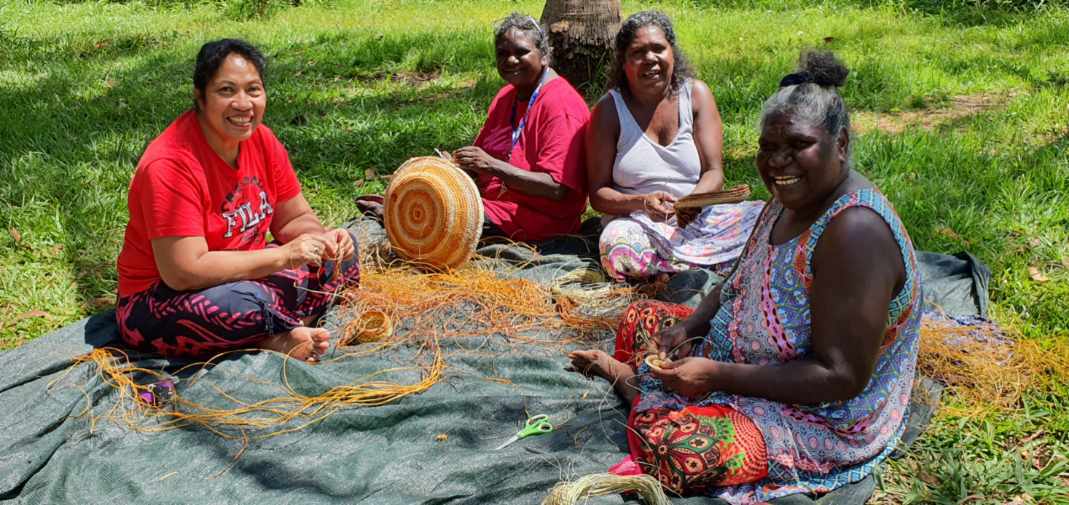The hands of the determined foragers belong to Ana and her older friends from the local Yolngu community. On weekends, they forage for pandanus leaves, before sitting together for hours, weaving baskets and jewelry. From the clinic to the bush, knowledge passes from ear to ear, where it is embraced and shared once again.
Learning from one another
Ana joined Miwatj as a Remote Area Nurse (RAN) in Galiwin’ku in 2012, then stepped up as our Centre Manager in 2015. Today, her impact extends far beyond the boundaries of the clinic she runs. On any given day, she could be driving community engagement, strengthening relationships with key service providers, managing conflict, and organising social events. At the heart of it all, she strives to learn from those around her for the benefit of the whole community.
“My approach is simple. To be successful, I need to connect with various organisations both locally and from the mainland so we can work together for the community. We can’t do everything ourselves; the key is to listen to the concerns of the community, share knowledge and experiences, and recognise cultural intelligence and cultural safety in learning from one another. I work in collaboration with the Traditional Owners, as well as local, non-government and government organisations including the National Indigenous Australians Association (NIAA), Marthakal Homelands Health Service, Shire Council, Yalu, ALPA CDP, Red Cross and the local school to run health campaigns and activities. The clinic has an ‘open door approach’ where we encourage and embrace suggestions from our community members to meet their needs. That’s how we work.”
Empowering her team
With Ana’s guidance over the last five years, Yolgnu staff at Galiwin’ku have been undertaking a greater level of responsibility, including gaining experience in management roles.
“While our Aboriginal Health Practitioners (AHPs) have exceptional clinical skills and knowledge, I’ve encouraged those willing to cover for their senior colleagues in management roles. In my absence, three of the AHPs, Joan, Rrapa and Bora are confident to act in the role of Health Centre Manager with the support of a designated Remote Area Nurse. Miwatj is empowering Yolngu staff to step up as leaders to own their clinics for their future. Speaking of future leaders, I am proud to say that one of my staff, Stuart McGrath is pursuing his career by undertaking a nursing degree part time with my support and preceptorship.”
We asked Ana for her advice for upcoming health care leaders in remote Indigenous communities.
1) Lead through serving
“To maintain a functional clinic in this role, you need to be flexible and willing to step into any position – clinical and non-clinical. I could start my day as the Clinical Manager and by ten o’clock, I’m a Remote Area Nurse. Come lunchtime, I’m a receptionist and by the end of the day, I’m a patient transport driver.”
2) Understand and connect with your staff
“In Galiwinku, we celebrate our achievements and special events together by having functions where all the staff participates in the preparation of the meal. For example, during Healthy Eating Week, we divided into groups to hunt and gather food to be cooked by the Yolngu staff as a demonstration of healthy traditional foods. Staff also go fishing together on the weekends. These activities make everyone feel connected.”
3) Keep open communication
“We have a daily morning briefing where all clinical and non-clinical staff come together. It’s an opportunity for all staff to meet new team member, share ideas they may have and keep one another updated on what’s happening in the community. It’s very important to approach issues with an open mind; and I encourage all senior staff to do the same. Sitting and chatting is the best way to resolve issues and mend relationships.”
Ana’s dream: A decade on this beautiful remote island
After five years leading our Galiwin’ku clinic, Ana could easily get a senior position in a city hospital. Thankfully, she isn’t looking to move on anytime soon.

